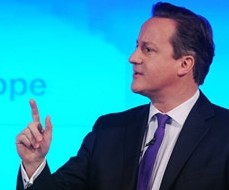
This morning, in his much anticipated speech on the European Union, David Cameron announced that he would seek to renegotiate the terms of the UK’s membership of the EU and then offer an in/out referendum to the British public. It was the sort of ‘announcement’ only possible in politics – something we’ve more or less known was coming for months, the details of which released the night before. The bulk of the speech was not revolutionary and was, for the most part, a reiteration of long standing British preferences in European integration: inter-govermentalism over supranationalism, economic issues over social issues, and widening rather than deepening integration.
The juicy detail, of course, was that if the Conservatives are returned to government at the next election they will hold a referendum by the middle of the next parliament. In his speech Cameron argued that “democratic consent for the EU in Britain is now wafer thin… That is why I am in favour of a referendum. I believe in confronting this issue – shaping it, leading the debate. Not simply hoping a difficult situation will go away.”
Should we take Cameron’s statement at face value? As I’ve blogged about previously, we have good reasons to be cynical about the democratic efficacy of referendums. Academic research on the reasons parties and government call referendums on the EU suggests that in many ways, hoping a difficult situation will go away is precisely what Cameron wants his speech to achieve. My own research, which I wrote about here, suggests that referendums on European integration are held when electoral pressure is high – when European integration is unpopular and elections are drawing near. Writing about referendums on the Constitutional treaty, Andreas Dür and Gemma Mateo argue that electoral competition between parties was one of the main drivers in whether a party supported holding a referendum on the Constitutional Treaty. Kai Oppermann argues that referendums on the EU can be classified into four types. Two of them, which fit Oppermann’s ‘defensive mode’, are particularly relevant to Cameron’s announcement. These are the ‘depoliticizing’ and ‘red-line’ referendum types, which are used to take the sting out of the politics of European integration and strengthen a government’s bargaining position in negotiations.
All of this research suggests that by calling for a referendum on the EU Cameron hopes to achieve three things:
1) To diffuse the threat from a burgeoning UKIP at the next election.
2) To diffuse pressure from the Eurosceptic wing of the Conservative party.
3) To strengthen the bargaining position of the UK in any renegotiations of the UK’s membership of the EU (which is itself largely driven by the first two concerns).
Two questions about Cameron’s referendum remain: Will it unite the Conservative Party and defuse the UKIP threat? And, will the referendum actually be held?
Initial responses seem to suggest that Cameron’s ploy has worked to unite the Conservative Party: the Conservative Home blog has been publishing the reactions of delighted Eurosceptics all morning. Only time, opinion polls, and election results will say whether it will be similarly successful in disarming the UKIP threat, but at the very least it will boost the Conservative campaigning position.
The answer to the second question is less straightforward. The interesting thing about the reasons I’ve given here for Cameron announcing a referendum is that none of them require a referendum to actually be held. The recent history of the politics of European integration in the UK is littered with referendums that were promised but never held. All three of the main parties have at some time or other promised referendums on a range of EU issues, from new treaties and the Euro, to a fully-fledged in/out referendums. Yet somehow, despite the support of all three parties for some form of referendum at some point, the 1975 referendum remains the only referendum on European integration the UK has actually held. By setting out the reasons why we should not have a referendum now and suggesting things that need to happen before a referendum is held, was Cameron laying the foundations to renege on his promise at a later date?
In its original incarnation, Cameron’s speech was due to be delivered from continental Europe, in the city of Amsterdam, a clear parallel to Margaret Thatcher’s famous Bruges speech. Thatcher’s Bruges speech is looked upon fondly in the mythology of Conservative Eurosceptics as the moment when the British Prime Minister, handbag in full swing, stood up to the creeping European super-state. The reality though is that the Bruges speech marked the beginnings of the Conservative infighting over Europe that would ultimately bring Thatcher down, haunt John Major during the ratification of the Maastricht treaty, and has reared its head again in recent months. By playing the referendum game, Cameron hopes to come out with a win over the EU, Conservative Eurosceptics and UKIP. He may however, have sowed the seeds of his own undoing. Ed Miliband and Nick Clegg have both come out against the referendum, meaning that the only way Cameron’s promised referendum will happen is if the Conservatives win a majority at the next election, something not even Conservatives think is likely to happen. Although he may have solved a short term problem, the only long term thing Cameron might have achieved is making a Labour-Liberal Democrat coalition even more likely in the event of another hung parliament.
Chris Prosser is a Dphil student in Politics at St Catherine’s College, Oxford, a lecturer in Politics at Christ Church, Oxford, and a graduate deputy editor of Politics in Spires. You can follow him on twitter @caprosser.








2 Comments